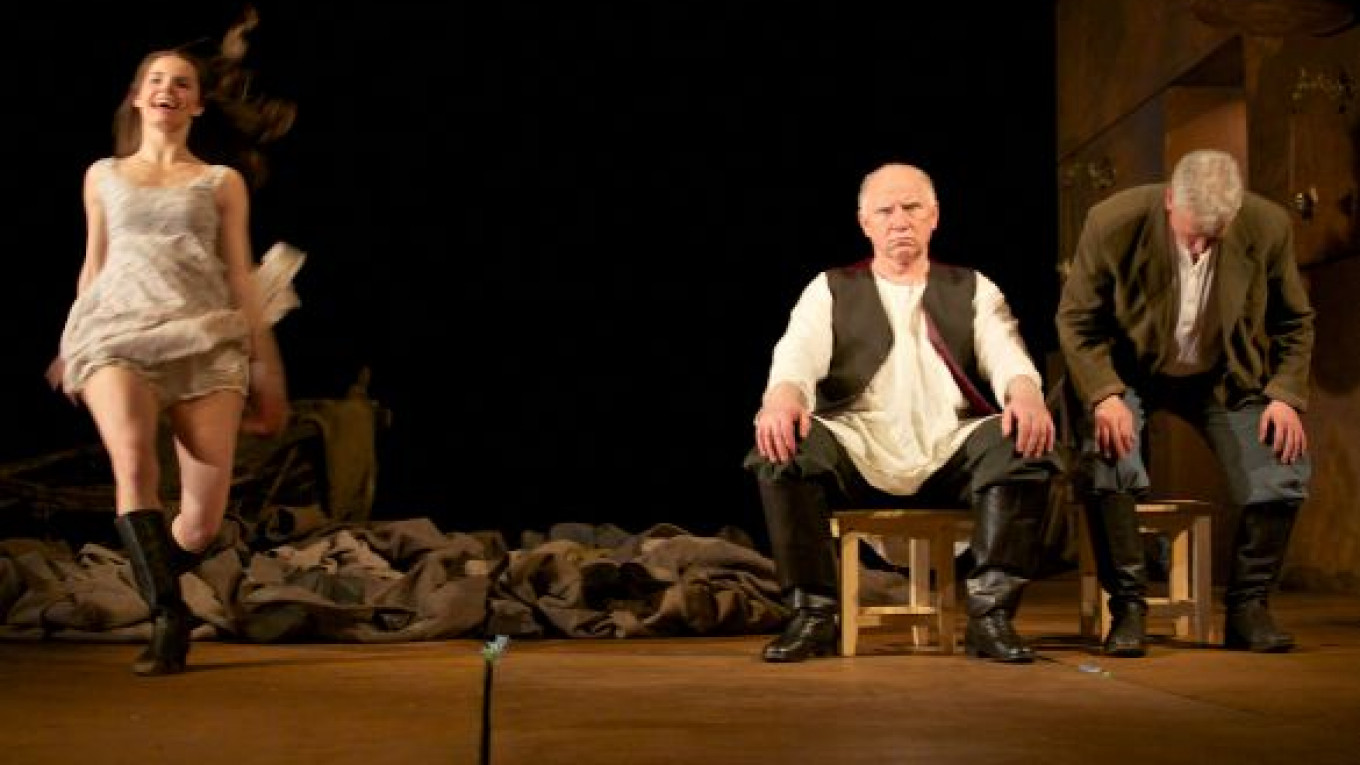"Lady Macbeth of the Mtsensk District," a 19th-century sketch by Nikolai Leskov, is arguably one of the harshest works in the Russian literary canon. Dmitry Shostakovich adapted it for the opera in 1932, but it is Leskov's original prose, written in 1865, that Kama Ginkas turned to for his latest production at the Theater Yunogo Zritelya.
Not surprisingly for those who know his work, Ginkas pulls no punches with this tale of perfidy, adultery and multiple, unrepentant murders. Retitling the piece as "Lady Macbeth of Our District" in order to bring the story closer to home, his production is a withering portrait of lives on a slippery slope leading to sin and death.
Ginkas in his famous productions of works by Chekhov, Dostoevsky, Shakespeare and other classic authors, has always been a master of mixing the horrid and the hilarious. He has a way of making audiences laugh when they should be crying, while inducing them to cry when they would expect to laugh. In "Lady Macbeth," however, the few laughs that do occur tend to be liberally sprinkled with bitterness and despair. Alongside his "Medea" in 2009, this is one of the darkest works I have seen Ginkas do.
Katerina (Yelizaveta Boyarskaya) is a spirited, strong woman married to a nondescript man, Zinovy (Alexander Taranzhin), who prefers to lurk in the shadows of his pious, brick-headed father Boris (Valery Barinov).
Joy, to say nothing of pleasure, is no welcome visitor in this house. This is a place where ritual — whether it is the drinking of tea or the serving of men by women — is the be-all and end-all of existence. Deviations from the dreary norm are not tolerated, period.
That doesn't mean, however, that a human being, particularly one with a spark inside her soul, cannot be tempted. As such, when the arrogant, lively young Sergei (Igor Balalayev) appears on the scene, the fires of hell begin burning a little brighter.
Ginkas and his designers keep the show dark and gloomy throughout. Set designer Sergei Barkhin built two grungy, high, rust-colored walls that seem to squeeze in on, and tower over, the actors from either side. The stage floor is a kind of roadway to nowhere, rising at a steep rake and disappearing into blackness. Lighting designer Yevgeny Ganzburg mostly keeps the light dim, relying heavily on shadows and on a single, wandering spotlight that might suggest a searchlight shining from a prison tower.
Katerina's rebellion against her joyless life is not planned. It is a combination of chance and nature that does it. Sergei pulls her close to him and that is pretty much all that is needed for the facade of the hard, ritualized life to crumble in pieces.
From there it is only a short step to take for Katerina to murder her father-in-law, her husband, and even her prepubescent nephew when he shows up to claim his inheritance.
Ginkas hardly pays any attention to the first adulterous act — it is virtually an afterthought before it begins. Even the murders are fairly quick and straightforward — actions Katerina must commit to maintain her newfound freedom.
What Ginkas does focus on are the consequences of the deeds. He compels us to watch actors' faces, to distinguish between a wry grimace and a sarcastic grin. We see the nuances that separate despair, doomed hope, defiance and rebellious abandon.
He also encourages us to consider the inevitability of the heinous acts. Before Katerina lays her nephew (Stepan Stepanyan) down to sleep one night, a pair of workers noisily cobble together a little coffin-like bed for him. She has not yet resolved to kill the boy, but in this production his fate is already sealed.
Boyarskaya's bold, intelligent Katerina is a match for doom only so long. She clings tenaciously to Sergei, the man who set her free, but her fate, too, is sealed.
One of the production's most beautiful moments, if "beautiful" is the proper word, is the death of the old father-in-law. Barinov stands motionless, an unchanging look of childlike hurt and confusion playing on his face. Ginkas holds the scene for what seems an eternity, a kind of caesura in the performance that begs us to stop amid the mayhem to consider what life and death mean.
"Lady Macbeth of Our District" (Ledi Makbet Nashego Uyezda) plays Sun., Dec. 21, 26 and Jan. 20 at 7 p.m. at the Theater Yunogo Zritelya, located at 10 Mamonovsky Pereulok. Metro Pushkinskaya. Tel. 495-699-5360. moscowtyz.ru. Running time: 2 hours, 30 minutes.
Contact the author at jfreedman@imedia.ru
A Message from The Moscow Times:
Dear readers,
We are facing unprecedented challenges. Russia's Prosecutor General's Office has designated The Moscow Times as an "undesirable" organization, criminalizing our work and putting our staff at risk of prosecution. This follows our earlier unjust labeling as a "foreign agent."
These actions are direct attempts to silence independent journalism in Russia. The authorities claim our work "discredits the decisions of the Russian leadership." We see things differently: we strive to provide accurate, unbiased reporting on Russia.
We, the journalists of The Moscow Times, refuse to be silenced. But to continue our work, we need your help.
Your support, no matter how small, makes a world of difference. If you can, please support us monthly starting from just $2. It's quick to set up, and every contribution makes a significant impact.
By supporting The Moscow Times, you're defending open, independent journalism in the face of repression. Thank you for standing with us.
Remind me later.







